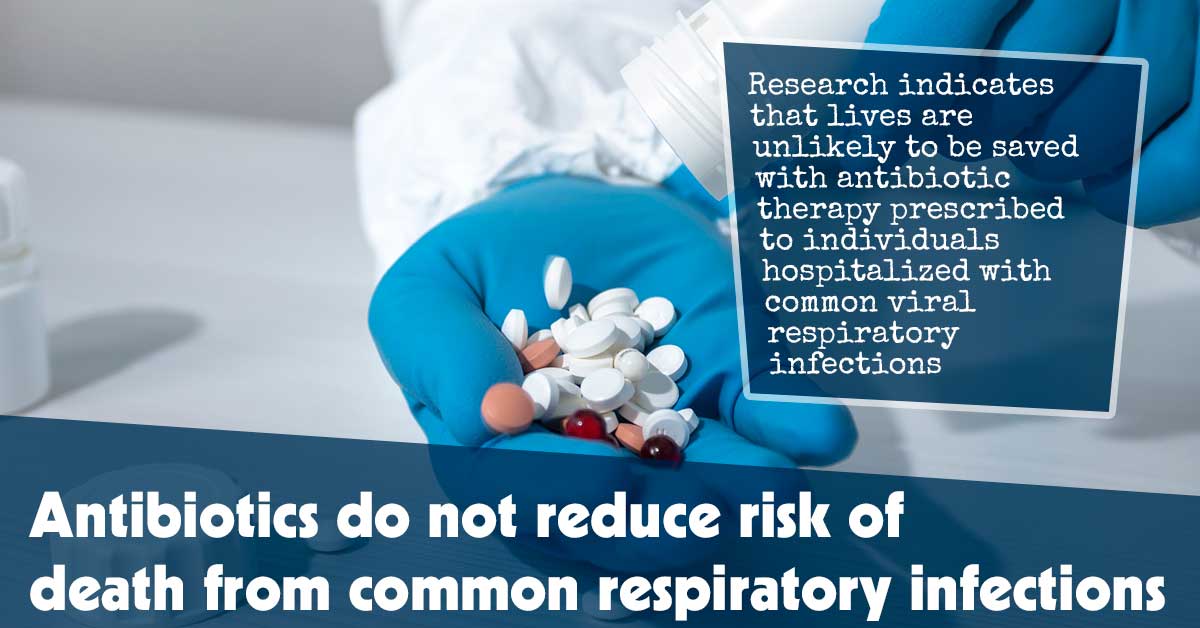Antibiotics are administered to most acute viral respiratory infection patients admitted to hospital. Research now indicates that lives are unlikely to be saved with antibiotic therapy prescribed to individuals hospitalized with common viral respiratory infections which include influenza.1✅ JOURNAL REFERENCE
DOI: 10.1016/S0140-6736(20)32063-8
Experiences from the Covid-19 pandemic indicate that antibiotics are not necessary in the majority of viral respiratory infection patients, and that bacterial co-infection fears could be exaggerated. This study supports this evidence, indicating that the risk of dying within 30 days is unlikely to be reduced with the prescribing of antibiotics to individuals hospitalized with common respiratory infections. Such a high level of potentially needless prescribing has significant implications given the increase in antimicrobial resistance threat.
Respiratory infections make up about 10% of the disease burden worldwide and are the most typical reason for antibiotic prescriptions. A lot of infections are viral and don’t respond to or require antibiotics, but concerns regarding bacterial co-infection frequently result in precautionary prescribing of antibiotics.
Concerns regarding COVID-19 bacterial co-infection resulted in extensive antibiotic use in the community and hospitals. Studies reported that antibiotics were given to about 70% of COVID-19 cases in some countries, despite the fact that their use was only warranted in approximately 1 in 10 of them.
In this analysis, the impact of antibiotic treatment on mortality was retrospectively assessed in 2,111 individuals admitted to hospital who tested positive with a throat or nasopharyngeal swab at hospital admittance for SARS-CoV-2, respiratory syncytial, or virus influenza virus from 2017 to 2021.
Hospital admittance routine respiratory infection tests were registered such as blood cultures and throat or nasopharyngeal swabs for common bacterial and viral pathogens. Individuals with a confirmed bacterial pathogen and individuals with other infections that required antibiotic treatment were excluded from the analysis.
Antibiotic treatment was started in more than half of viral respiratory infection patients when they were admitted to hospital. An additional 168 individuals received antibiotics later during hospitalization. In total, 63% of individuals were given antibiotics for respiratory infection while hospitalized.
Overall, 168 individuals died within 30 days, 119 individuals given antibiotics when admitted, 27 individuals given antibiotics later while hospitalized, and 22 individuals did not receive antibiotics.
Analyses adjusting for type of virus, age, sex, disease severity, and underlying illnesses, revealed that individuals prescribed antibiotics anytime throughout their hospital stay were twice as likely to die within 30 days compared to individuals who did not receive antibiotics, and mortality risk increased by 3% for every day of antibiotic treatment in comparison to individuals not receiving antibiotics. Starting antibiotic treatment at hospital admission wasn’t linked to an elevated risk of death within 30 days.
Although the analyses were adjusted for underlying disease and severity of disease, this paradoxical result could still be as a result of a pattern of antibiotic prescription where individuals with more underlying illnesses and the sicker individuals were both more likely to get antibiotics and to die.
Reducing the duration and usage of in-hospital antibiotic treatment in viral respiratory infection patients would reduce the risk of antibiotic exposure side effects and help deal with the increasing antibiotic resistance threat. Better quality evidence is however needed from prospective randomized studies to determine whether viral respiratory infection patients admitted to hospital need antibiotic treatment.
There are some limitations to the study, such as that it’s an observational study so can’t prove causation, and even though sex, age, virus type, and underlying illnesses were adjusted for, there could have been other unreported factors that could have affected the outcome, which include socioeconomic background and smoking. Data were also not available for biomarkers/biochemistry which include white blood cell, C-reactive protein, and creatinine.



